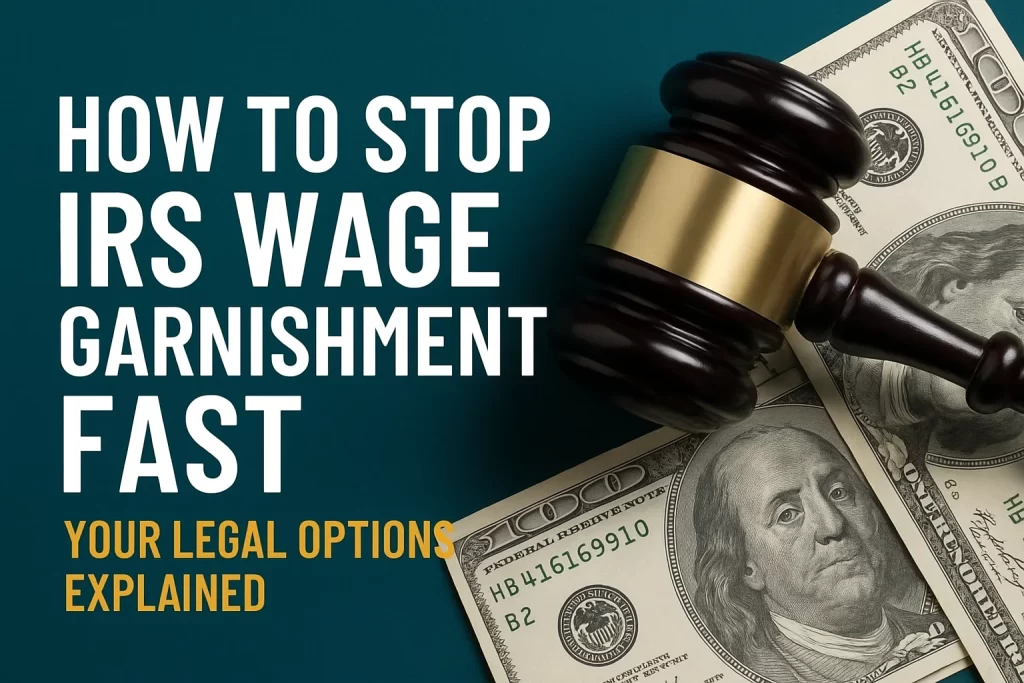Wage garnishment by the IRS is one of the most stressful financial challenges a taxpayer can face. When the IRS begins to deduct money directly from your paycheck, it can leave you struggling to cover your basic living expenses. The good news is that you have legal options to stop or avoid IRS wage garnishment—but you must act fast.
In this comprehensive guide, we’ll walk you through what IRS wage garnishment is, how it works, and the fastest ways to stop it legally. Whether you’re already experiencing garnishment or just received a warning letter, this blog will help you understand your rights and find the right tax relief strategy.
What Is IRS Wage Garnishment?
IRS wage garnishment, also called a wage levy, occurs when the IRS legally seizes a portion of your paycheck to cover unpaid tax debts. This is not something that happens overnight. It’s usually the last step after multiple attempts to collect payment through letters and notices.
Once garnishment begins, your employer is legally obligated to withhold a portion of your wages and send it directly to the IRS. The amount taken can be substantial, often leaving you with much less than you need to live on.
How Much Can the IRS Garnish from Your Paycheck?
Unlike private creditors who must sue you in court before garnishing wages, the IRS can do it administratively after sending you proper notices. The amount they can garnish depends on your filing status, number of dependents, and pay frequency. In many cases, the IRS leaves you with only the bare minimum needed for living expenses—the rest goes toward your tax debt.
The IRS Wage Garnishment Process
Here’s a simplified overview of how the IRS wage garnishment process typically unfolds:
- Tax debt becomes overdue
- IRS sends a series of notices, including CP14 (Notice of Unpaid Taxes)
- Final Notice of Intent to Levy and Notice of Your Right to a Hearing (LT11 or Letter 1058) is sent
- 30-day waiting period begins
- If no action is taken, the IRS contacts your employer and starts garnishment
How to Stop IRS Wage Garnishment Immediately
Stopping IRS wage garnishment quickly requires immediate and informed action. Here are the most effective legal methods:
1. Pay Your Tax Debt in Full
This is the fastest way to stop garnishment, but not always feasible. Once your balance is paid, the IRS releases the garnishment immediately.
2. Set Up an Installment Agreement
You can negotiate a payment plan with the IRS that fits your financial situation. Once accepted, the IRS will typically release the wage garnishment.
3. Submit an Offer in Compromise (OIC)
If you can’t afford to pay your full debt, the IRS may accept a lower amount through an Offer in Compromise. While it’s under review, wage garnishment may be suspended.
4. Apply for Currently Not Collectible (CNC) Status
If paying your tax debt would cause significant financial hardship, you can request CNC status. This halts all collection actions, including garnishment.
5. File for a Collection Due Process Hearing
If you act within 30 days of receiving the Final Notice of Intent to Levy, you can request a hearing and halt collection while your case is being reviewed.
6. Work with a Tax Relief Professional
Navigating IRS bureaucracy is complex. A tax relief attorney or enrolled agent can help you respond quickly, file the right paperwork, and negotiate favorable terms.
Why You Should Act Fast
The longer you wait, the more paychecks the IRS will garnish, and the harder it becomes to reverse the process. Acting quickly not only helps protect your income but may also open up more resolution options.
In many cases, wage garnishment can be halted within days of taking action. The key is knowing which solution you qualify for and executing it properly.
How American Tax Defense Can Help
At American Tax Defense, we specialize in stopping IRS wage garnishments quickly and legally. Our experienced tax professionals will evaluate your financial situation, negotiate directly with the IRS on your behalf, and create a customized strategy to protect your income and assets.
Whether you need to set up a payment plan, apply for an Offer in Compromise, or request CNC status, we’re here to help every step of the way.
Final Thoughts
IRS wage garnishment can be financially crippling, but you don’t have to face it alone. By understanding your rights and exploring your legal options, you can take control of your financial future and stop wage garnishment before it does lasting damage.
Ready to stop wage garnishment now? Contact American Tax Defense for a free consultation and immediate assistance.







